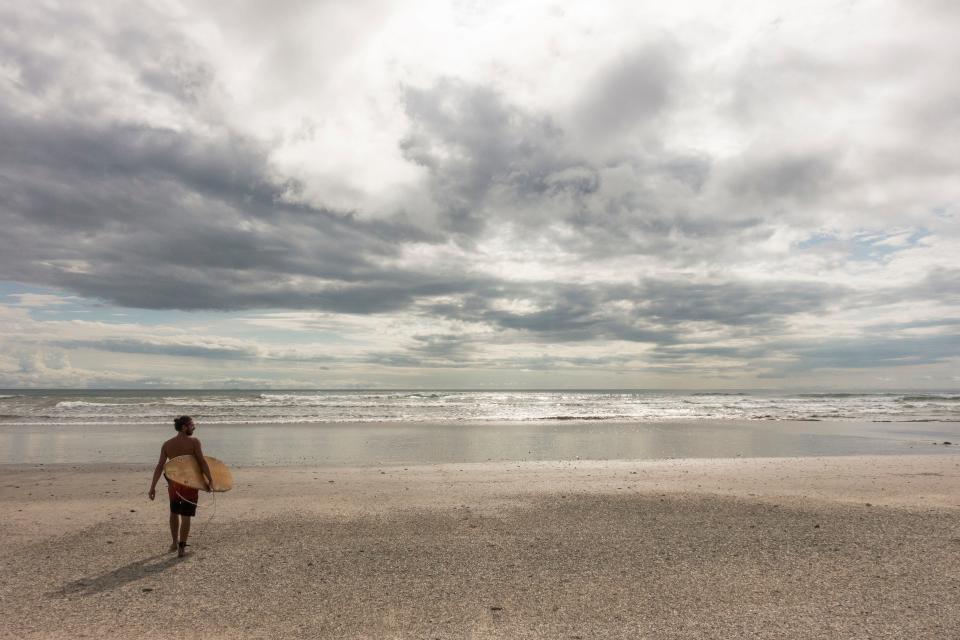I moved from Colorado to a Blue Zone in Costa Rica. I thought I was healthy before, but seeing 70-year-olds surf showed me how much more content I could be.
Martha Pierce, 34, bought a one-way ticket to Costa Rica two weeks ago.
The business coach now lives and works from one of the world's original five Blue Zones.
Pierce said people in Santa Teresa are more relaxed, more mobile, and more focused on community.
This as-told-to essay is based on a conversation with Martha Pierce, a 34-year-old business coach who recently bought a one-way-ticket to Nicoya, Costa Rica. The region is one of the world's original five Blue Zones, where people appear to live longer than average.
I'm currently sitting in Santa Teresa, Costa Rica. I moved here two weeks ago.
I had always planned to do this, but I kept extending the timeline of when I was going to move. I finally just decided to go for it and do the thing I always wanted, which was run a business and serve women while also pursuing my passion, which is travel.
I had been to Costa Rica before, and I wanted to be in a climate that was very different from where I previously was in Colorado, which has a lot of mountains and no beaches.
I was familiar with the Blue Zone diet. One of my clients is really good friends with Mark Hyman, who has done some extensive research into Blue Zones. That same person also knows Dan Buettner, who has a series on Blue Zones on Netflix.
I generally understand the diet, the lifestyle, the approach. In many ways, I already lived those traits. I have behaviors that are similar to people in Blue Zones. For instance, I try to eat plant-based to some degree.
But I do notice that people here have a much more relaxed approach to life. People are way less stressed. It's obvious.
I'm less stressed too. I'm noticing a sense of more fulfillment. As Americans, and for me personally, I felt like I was always reaching for something, looking for the next client, the next revenue, the next milestone. And here, there's a sense of contentment and an experience of community that feels quite different.
I'll give you an example: In the town I'm in, most people drive either older cars or ATVs or they drive scooters, which are these mini motorcycles. About three days into living here, I rented a scooter.
The scooter started stalling up a hill and I thought 'oh no, what am I going to do?' I'm just thinking on my feet and from across the road, a girl pulls up in a beat-up SUV. She says, 'hey, do you need some help?' in perfect English.
We ended up connecting. She's an intuitive eating coach. She lives here full time. She's also from Colorado, strangely enough.
That kind of experience is not something I feel like I would have ever had in America. Someone pulling over to help you on the side of the road? It's not that common in bigger American cities.

People here are also definitely more active. About half the population surfs. It's a surfing town, so there's a culture of that here. I don't currently surf but I'm open to learning.
People are often running. There's a local gym where people lift weights, which I've been to a few times.
The aesthetic of the people here is quite different from what you would see in a typical American city, where older people are more overweight or less mobile.
I was at the beach yesterday with a new friend and we noticed a woman who had to have been in her seventies. She was carrying a surfboard and she had a wetsuit on. It was clear she had just gotten done surfing. That's so cool. That's not something you would see in California, for example.
The biggest adjustment has been adjusting to the attitude of the people here. You don't realize you're stressed when you're around a whole bunch of other people who are also stressed.
The speed at which things move here is just slightly slower. I definitely feel more relaxed.
Read the original article on Insider


